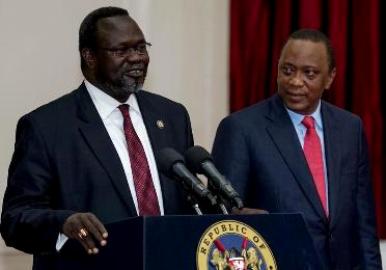Kenyan MPs criticise Kenyatta over “red carpet” reception for S. Sudan rebel leader
June 6, 2014 (NAIROBI) – A small group of Kenyan MPs critical of president Uhuru Kenyatta have criticised what they said was a “red carpet” reception given to South Sudanese rebel leader Riek Machar during a six-day visit to the country last week.

However, five MPs protested on Thursday a week after Machar’s visit, saying the honoured reception given to the rebel leader was an insult to the South Sudanese sitting elected president in the name of President Salva Kiir.
The protesting legislators included Kibra MP Ken Okoth, Wajir South MP Abdulahi Diriye, Ndhiwa MP Agostinho Neto, Matungulu MP Stephen Mule and Senator Daisy Kanaiza.
“South Sudan still has a legitimate government headed by His Excellency Salva Kiir, his problems notwithstanding. Kenya should therefore be working with the elected leaders of South Sudan,” Kenyan Daily Nation quoted the MPs as saying.
The MPs also said any talks held in Kenya should be attended by “both President Kiir and Dr Machar to avoid creating suspicions.”
“It is bad that a rebel leader in the person of Dr Machar should be given red carpet reception in Nairobi as that might portray Kenya as a partial peace arbiter,” they argued.
The group, who are members of the parliamentary human rights caucus, also want the IGAD member countries to pass a resolution to transfer the peace negotiations to Nairobi from Addis Ababa, arguing that Kenya midwifed the initial process and the regional body is chaired by President Kenyatta.
“Should we do the above, Kenya will be fairly overseeing the implementation of the Cessation of Hostilities Agreement,” the MPs stressed.
They also attacked President Kenyatta, accusing him of failure as IGAD chairman to ensure implementation of the Cessation of Hostilities Agreement between Kiir and Machar.
However, another MP representing a Nairobi constituency downplayed the criticism uttered by the group saying this was an “internal politics as usual”, saying President Kenyatta had done the right thing by warmly welcoming the rebel leader.
The MP counter-argued that in order for peace to come to South Sudan the Kenyan president had the right and obligation to consult with both government and opposition leaders in a way that should portray neutrality in the conflict.
“Kenya has always been neutral in the Sudanese conflicts, and this has earned it respect and leverage to successfully mediate such conflicts even in the past,” he said.
CALLS TO EXPEL FORMER SPLM DETAINEES
The MPs of five also submitted a motion to parliament requesting that the former 11 SPLM detainees led by the former secretary general, Pagan Amum Okiech, should be expelled from Windsor Hotel in Nairobi describing them as “selfish” people who have engaged in a “third bloc political reorganisation, which does not help in the peace process” to end the war.
The protesting MPs further wanted cabinet secretary, Joseph ole Lenku, who is in charge of the national security docket, to expel the 11 former detainees and demand they seek asylum by following normal procedures.
“The said leaders were to help in the peace process and the negotiations taking place in Ethiopia, and not live in opulence at the expense of the Kenyan taxpayers. They are engaging in selfish political reorganisation that does not help South Sudan,” the MPs said in a joint statement.
The former detainees were initially allied to Machar, but changed their mind after their release despite efforts exerted by the rebel leader to secure their freedom.
The group has opted to form what they called a third bloc and refused to join either side in the conflict. However, their participation to make an impact in the peace process has always been blurred as the two warring parties dominate the terms of the talks.
Analysts say the attitude adopted by the group is an attempt to make them look like “good guys” in the eyes of the international community with the hope that they may snatch the leadership of the proposed transitional government should Kiir and Machar be forced to step aside.
However, the decision to remain neutral has also earnt the group criticism, with some describing them as mere “opportunists”.
(ST)
